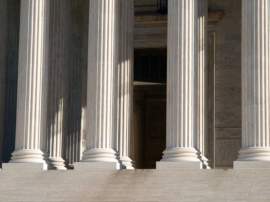
Edwards v. Aguillard

The Background of Edwards v. Aguillard:
Edwards v. Aguillard was a landmark legal case, which concerned the teaching of creationism. Edwards v. Aguillard was heard by the Supreme Court of the United States in 1987.
The concept of creationism arose out of modernist higher criticism and its rejection of Fundamentalist Christian movement. Teaching of evolution became a part of the public school curriculum and was primarily based on “Darwinism.” Many states rejected this principle, for they feared that “Darwinism” caused German militarism; this ideology was observed as a threat to traditional morality and religion. As a result, several states passed legislation to ban the teaching of evolution.
As the United States, during the 1960s, attempted to catch up in science, the country introduced new teaching standards that ultimately reintroduced evolution, and an overall movement away from creationism. Although attempts were made to reintroduce legal bans directed towards the teaching of evolution, the Supreme Court ruled that bands on teaching evolutionary biology are unconstitutional for they violate the establishment clause of the United States Constitution, which effectively forbids the Federal Government of the United States from advancing a particular religion.
In the 1980s, several states attempted to introduce a curriculum based off creationism through the teaching of evolution; however, the Louisiana legislature passed a law, entitled the “Balanced Treatment for Creation-Science and Evolution-Science in Public School Instruction Act.” The Act did not require the teaching of creationism, but did require that when evolutionary science was taught “creation science” must be taught as well.
Edwards v. Aguillard Trial:
Lower courts ruled that State’s purpose for passing the law was to promote the religious doctrine of “creation science” and in response to this belief; the State appealed the ruling to the Supreme Court.
On June 19, 1987 the United States Supreme Court, in a 7-2 majority opinion, ruled that the Act contained an unconstitutional infringement in regards to the Establishment Clause of the First Amendment, based on the three-pronged Lemon Test.
The Case Profile of Edwards v. Aguillard:
The following is a case profile of the legal trial eponymously titled ‘Edwards v. Aguillard’:
Date of the Trial: Edwards v. Aguillard was argued on December 10, 1986
Legal Classification: Administrative Law; this legal field associated with events and circumstances in which the Federal Government of the United States engages its citizens, including the administration of government programs, the creation of agencies, and the establishment of a legal, regulatory federal standard
United States Reports Case Number: 482 U.S. 578
Date of the Delivery of the Verdict: Edwards v. Aguillard was decided on June 19, 1987
Legal Venue of Edwards v. Aguillard: The United States Supreme Court
Judicial Officer Responsible for Ruling: Chief Justice William Rehnquist
Verdict Delivered: The Supreme Court in Edwards v. Aguillard ruled that the teaching of creationism in public schools is unconstitutional because it attempts to advance a particular religion, and as a result, infringes on the First Amendment to the United States Constitution.
NEXT: Employment Division v. Smith




















